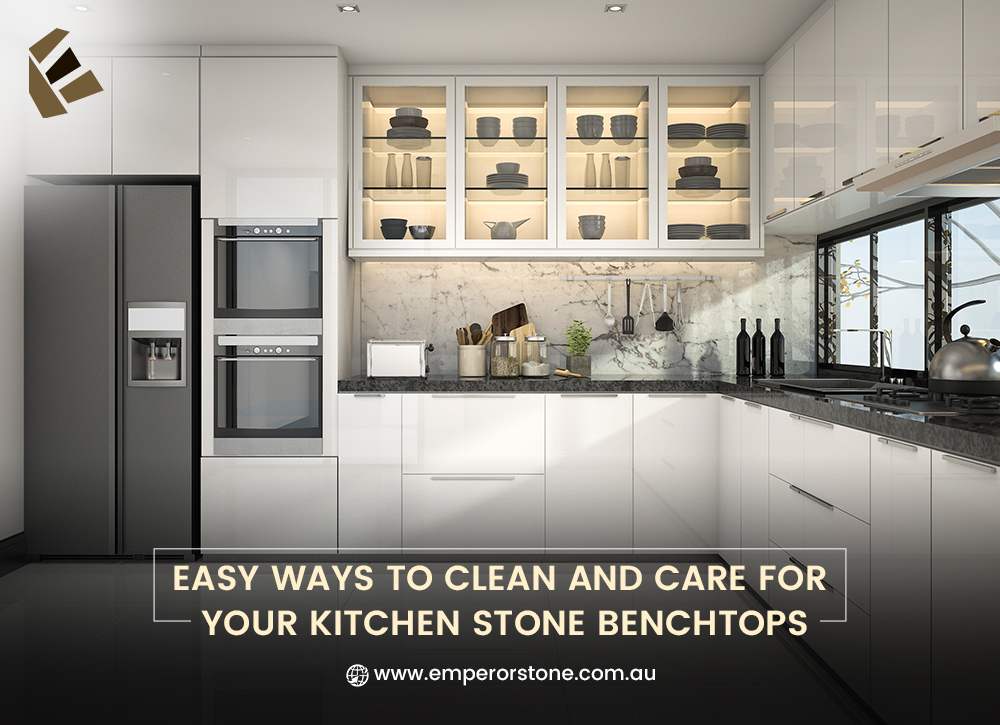Easy Ways to Clean and Care For Your Kitchen Stone Benchtops

Stone kitchen benchtops are an excellent choice for modern kitchen countertops for various reasons. Stone benchtops in Adelaide are in great demand because of their easy upkeep and low maintenance. However, any kitchen countertop undergoes spills and stains in everyday use and requires little care to keep it in its best condition. Hence, it is essential to understand what it takes to safeguard your stone kitchen benchtops from molds, spills, stains, and cracks. Here is a complete guide that will help you maintain your stone benchtops and keep your kitchen space fresh and tidy.
But, before we delve deep into the cleaning process, it is essential to learn the type of stone kitchen benchtops and their characteristics to prevent the surface from potential hazards.
Types of Stone Benchtops:
Marble
Marble is the most exquisite and timeless material for kitchen countertops. This sophisticated material is easy to clean and heat-resistant. However, it is one of the most expensive benchtop materials, so you definitely can’t afford to damage the surface very often. It is crucial to protect the benchtop surface from liquids and other substances that cause stains. Cleaning the countertop surface with a pH-neutral cleaner and a soft cloth for cleaning marble countertops will add life to your kitchen. One must also consider regular surface sealing to avoid spills penetrating the gaps in the countertops.
Granite
Granite benchtops have been increasingly used in modern households because of their aesthetic appearance and heat-resistance properties. Although daily cleaning is helpful for keeping the granite benchtop clean, resealing the granite benchtops every two or three years will protect the surface from germs and moisture depositing.
Engineered Stone
Engineered stone or quartz benchtops are versatile and a perfect choice for many reasons. Their non-porous surface makes them a hygienic alternative compared to natural stone. They are highly resistant to heat and stains and easy to clean. However, it is essential to clean your benchtop frequently to keep it free from germs, marks, stains, and dirt. An easy trick to keep your Engineered stone Benchtops Adelaide is to wet the surface and clean it using a mild, non-abrasive liquid soap every day after you’re done with cooking.
What items can cause stains on the Stone Kitchen Benchtops Adelaide?
Many kitchen ingredients and food products, such as turmeric, beetroot, coffee, lemon juice, food colour, red wine, oils, berries, and sauces, can leave stains and ruin the appearance of kitchen stone benchtops. Besides, sharp kitchen accessories and other household items such as knives, hot pots, abrasive cleaners, bleach, and harsh chemicals can also damage the countertops.
Do’s and Don’t Of Cleaning Kitchen Stone Benchtops:
Do’s:
Clean up spills on the spot
Natural and engineered stone can quickly absorb stains if not cleaned immediately. One way to avoid spills damaging the benchtop surface is to clean it with a damp cloth immediately after use.
Polish the surface with appropriate sealer regularly
Unsealed kitchen stone benchtops like granite and marble are prone to stains from food and drinks. The porous surface can quickly absorb spills and contaminate the surface with moisture and germ build-up. Regular sealing of the stone benchtop surface protects the surface from potential damage from contamination.
Be careful when working on potentially vulnerable areas
An essential measure to care for Stone Benchtops Adelaide is to look after exposed areas such as joints or ends of the benchtops where heavy pressure can cause damage.
Use mild soaps and water for daily cleaning
The right way to clean stains on kitchen stone benchtops is by mixing mild soap with warm water and wiping it using a soft, non-abrasive cloth. Avoid using hot water, harsh detergents, and oil-based cleaners.
Dry the benchtop
As simple as it may seem, drying the countertop immediately after use is a simple preventive measure to have a shiny benchtop surface even after many years of use.
Don’ts:
Avoid cutting on the surface directly
If you are using your benchtop as a chopping board, stop there. Repeated exposure to sharp objects on the same spot may result in scratches or wear down the polish. Thus, it would be better to use a chopping board for food preparation than cutting on the benchtops directly.
Do not place hot food on the benchtop surface
Avoid placing hot items directly onto the benchtops to prevent discoloration and cracking. Remember, stone benchtops are heat-resistance and not heat-proof. Use trivets, coasters, or insulated mats whenever you want to place a hot item on the benchtop.
Avoid abrasive scrubbers and harsh cleaners
You must be very careful when choosing the cleaning products for Stone kitchen benchtops in Adelaide. Silicon-based sprays, acidic cleaners, oil soaps, and abrasive scrubbers are big “NO” for cleaning Stone kitchen benchtops. Instead, you should invest in a good quality mild dishwashing soap and a soft microfibre cloth. Use a plastic spoon or spatula to remove stubborn stains that do not come off quickly. This way, you can prevent the benchtop from scratch while cleaning it.
A spotless, shining kitchen is all we admire. That’s why looking after your kitchen stone benchtops is the top priority in many households. Although Stone Kitchen Benchtops require less care and maintenance, timely upkeep will increase their life. While the above tips will help you keep your benchtops clean, discussing a stone-specific maintenance program with your stone supplier is essential to minimize the home cleaning efforts.



